How to Win Patients’ Trust – Key Takeaways from Disruption Talks: Patient Engagement in Healthcare

Without mutual trust between healthcare providers and patients, even the most sophisticated technological solutions won’t improve patients’ medical outcomes. We gathered experts from across digital healthcare – both from dynamic startups like Keto-Mojo, as well as enterprises like Roche – and with this patient-centered approach in mind, discussed the essential aspects of patient engagement:
- Patient engagement best practices.
- Patient journeys.
- AI solutions in healthcare.
- Change management.
- Roadblocks that healthcare systems and companies should be aware of.
- Hopes for how technology can help diagnose and treat patients in the future.
There might not have been a more opportune moment for this conversation. The COVID-19 pandemic is exposing health professionals and whole healthcare systems around the world to a new set of challenges. However, it is also providing an opportunity to accelerate the digitization of healthcare.
The talk provides a number of insights into how to make this transformation successful.
#1 Patient journeys – Design with empathy and a deep understanding of patients’ needs
Studies show that patients who are actively engaged in their healthcare, experience better health outcomes, and their habits support good health and effective treatment. This makes it critical to ensure they remain engaged as they interact with technology as part of their healthcare.
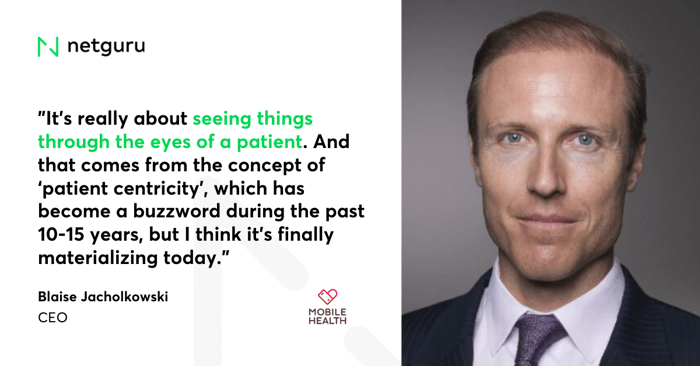
“It’s really about seeing things through the eyes of a patient. And that comes from the concept of ‘patient centricity’, which has become a buzzword during the past 10-15 years, but I think it’s finally materializing today,” notes Blaise K. Jacholkowski, CEO of Mobile Health, a company focused on helping cancer patients.
Katie McCurdy, the founder of Pictal Health, a startup helping patients with complex health issues to tell their stories visually, is concerned with removing the barriers that patients encounter during their treatment. Interpreting the data might be the biggest hurdle to get over. “Most health records make it difficult to see the patient’s whole journey and to understand where someone has been and where they are going. I’m hoping that new digital tools will help us better see the full picture.”
All panelists agree that attempts to digitize healthcare won’t succeed without including patients in the process.
Alain Bindels, the Head of Innovation Facilitation and Digitalization at Roche, the world’s largest biotech company, underscores how important it is for patients to be involved in designing tech solutions, and for patient entrepreneurs to work together with institutions and corporations.
“Before developing your app, you have to do your homework. It’s vital to understand all the emotions, pains, and motivations of both patients and caregivers. Don’t think only about the product. Start by understanding and mapping the problem,” adds Jacholkowski.
.png?width=700&name=Katie%20Disruption%20Talks%20(1).png)
But how do you actually get patients involved and develop empathy toward them? “The first step is to have people on your team who are familiar with UX research methods and who are accustomed to reaching out to people: recruiting patients, interviewing, observing them, and doing usability testing of prototypes with patients,” says McCurdy.
#2 Collecting data to benefit patients
The same high standard should be adopted in medical data collection.
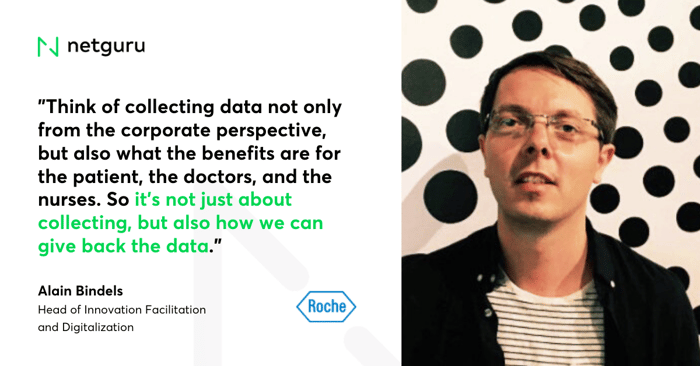
“Think of collecting data not only from the corporate perspective, but also what the benefits are for the patient, the doctors, and the nurses. So it’s not just about collecting, but also how we can give back the data,” stresses Bindels.
As he puts it, data management transparency becomes not only crucial for technology solutions to become successful, but a moral obligation for the whole industry.
#3 Introducing new healthcare professions and strengthening the human connection
The subject of data brings the panelists to the issue of data abundance and the need to interpret all the data coming in. Right now, some things are being recorded but not thoroughly analyzed or taken into account. McCurdy thinks it’s going to be helpful to introduce a new profession, data interpreter, or data nurse, who would assist with these tasks.
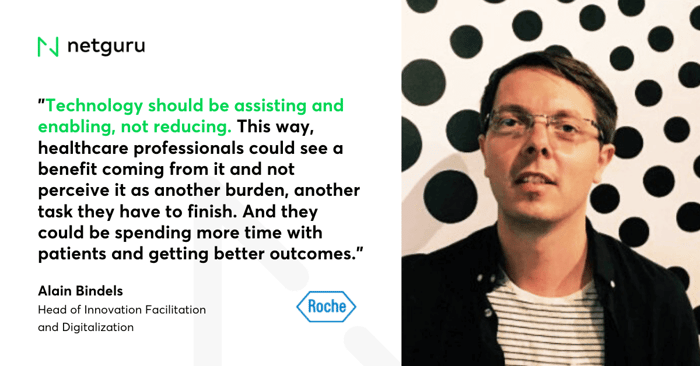
This might go against the common notion of digitization: replacing human jobs with technology. Bindels counters this idea, explaining that technology should be assisting and enabling, not reducing. “This way, healthcare professionals could see a benefit coming from it and not perceive it as another burden, another task they have to finish. And they could be spending more time with patients and getting better outcomes.”
The same goes for AI, which some doctors worry might replace them in the future. As Paweł Jarmołkowicz of Netguru mentions, “it’s very important for patients not to be left alone with the technology. There has to be a doctor supporting the process all the time,” says Wojciech Radomski, CEO of StethoMe, a startup providing such digital monitoring tools.
The consensus among the panelists is that technology should strengthen human connections, not remove the human factor from healthcare.
#4: Remote solutions through AI-backed technologies
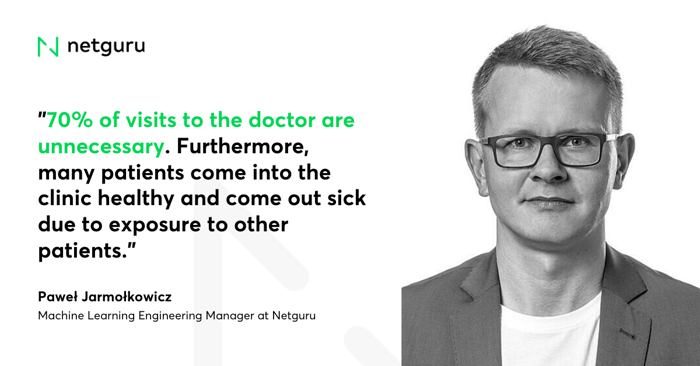
Jarmołkowicz brings up the statistic that up to 70% of visits to the doctor are unnecessary. Furthermore, many patients come into the clinic healthy and come out sick due to exposure to other patients. So the real issue, which has become clear during the current pandemic, is to provide ways for patients to self-diagnose and allay their doubts from home.
“It’s very important to have as many tools as possible that will allow patients to monitor themselves at home, ” says Radomski.
But you need to have AI solutions that are able to detect abnormalities. Otherwise, it’s a huge amount of data, which the doctors are not able to analyze. “You need to provide the software behind the hardware that would be able to analyze the data and detect abnormalities and alert the patient that they need to take care of themselves,” adds Radomski.
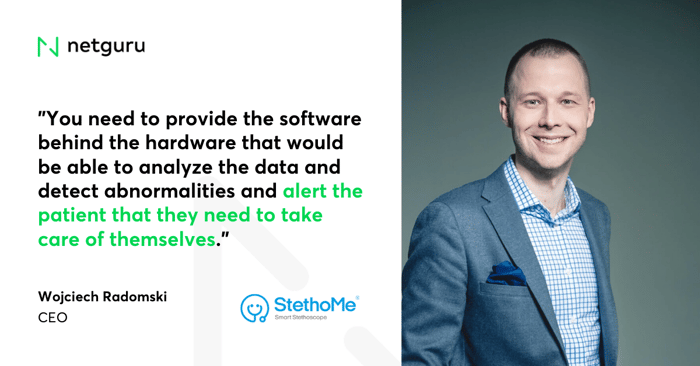
There are still multiple roadblocks stopping AI from being the go-to solution for these kinds of screenings.
“AI-based technology has so many uses, but also many blockers: the lack of regulation, safety of the data-sharing platforms that can collect data without compromising privacy… Do we have enough knowledge to understand the full scope of parameters? Do patients and caregivers trust AI to make calls?” asks Sebastian Boethius, Director of Technology at Keto-Mojo.
“Maybe as a society, we’re not ready yet to be diagnosed by machines. Maybe only to have a second opinion,” he adds.
#5 Need for a system-level change
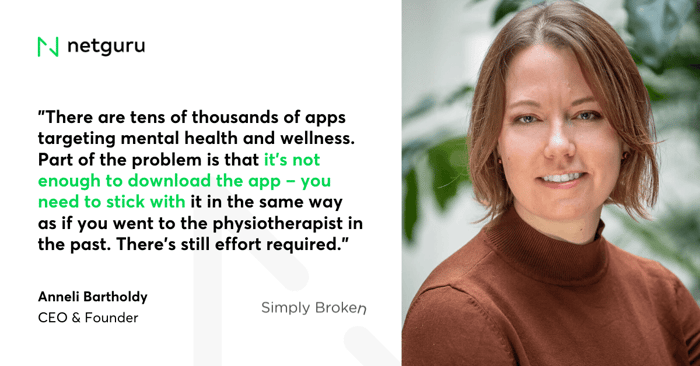
“There are tens of thousands of apps targeting mental health and wellness. Part of the problem is that it’s not enough to download the app – you need to stick with it in the same way as if you went to the physiotherapist in the past. There’s still effort required,” observes Anneli Bartholdy, CEO and Founder of Simply Broken, an organization that is removing barriers in access to self-care technologies.
Sometimes the tools are not serving their purpose as many people, especially those struggling with mental health issues, are unable to sift through that much noise to get to the app that might serve them best. And, as Bartholdy points out, nowadays there’s as much misinformation there as in the media, which can potentially make the tool harmful rather than helpful.
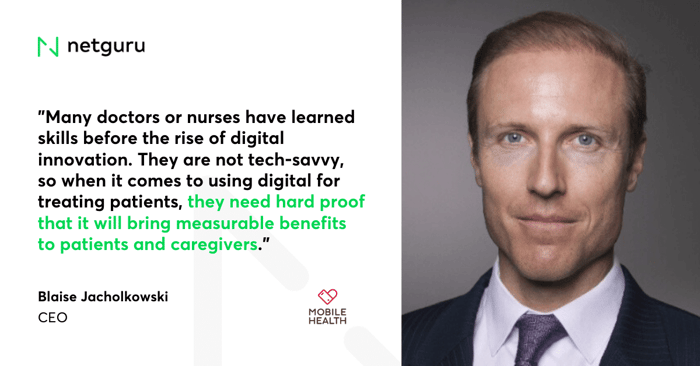
Besides, healthcare professionals might be reluctant to introduce digital tools in their practice. “Many doctors or nurses have learned skills before the rise of digital innovation. They are not tech-savvy, so when it comes to using digital for treating patients, they need hard proof that it will bring measurable benefits to patients and caregivers,” says Jacholkowski. “They need to see real benefits to it.”
“For us at Mobile Health, we need to persuade doctors about the value of the solution, and then they’ll prescribe the app to their patients,” he adds.
That’s a process that’s not being made easier by the existence of so many apps – it just makes access to academic research and patients more difficult, thinks Bartholdy.
“We’re facing the problem of scarcity and abundance – with an abundance of health apps, getting clinical trials and validation is hard if you are not connected. But thanks to companies like Mobile Health, it becomes a norm,” says Bartholdy.
There’s also a need for collaboration to manage change: between doctors and patients and between big healthcare companies and scaleups and startups.
Keeping the human element in health technology
During the discussion of the current crisis, Alain Bindels of Roche reveals that he himself had been infected with COVID-19. What helped him get through it was to have another infected person that he could virtually talk to. “So, the technology enabled me to do it, but it was actually all about experiencing it with somebody and a human connection,” he recalls.
This personal insight might help us see the main premise of the future of technology that all the panelists emphasized. And the current crisis is just accelerating the digital transformation.
For the full recording of Disruption Talk: Patient Engagement in Healthcare, sign up here.

















.jpg?width=384&height=202&name=Netguru-Biuro-2018-6425%20(1).jpg)







